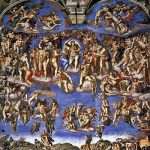Rewriting our theology
Would you go to work if someone said that you could go if you felt like it, but that it didn’t matter if you didn’t, because everyone would get rewarded in the same way? Maybe you would, but most people wouldn’t bother. What would be the point in putting in time and effort if it didn’t make any difference anyway? The number of workers would fall drastically.
Maybe the Church of Ireland has got itself into that situation. In an effort to be all-embracing, it has said that everyone’s beliefs are valid and that the gracious Lord won’t exclude anyone.
Certainly, Jesus accepted all who came to him in faith; but equally those who rejected him were warned in no uncertain terms. Our Church has shifted its ground. We have said Jesus accepts everyone; we have implied that he accepts even those who rejected everything he taught. As Advent arrives again next Sunday, the season of theological shift arrives.
Revelation Chapter 1 verse 7 has the following words in the King James translation:
Behold, he cometh with clouds;
and every eye shall see him,
and they also which pierced him:
and all kindreds of the earth shall wail because of him.
Even so, Amen.
The words inspired John Wesley to write the following verse in his hymn ‘Lo! He comes with clouds descending’. There was no mistaking Wesley’s understanding of Revelation, if you rejected Jesus, then the end of life and the day of judgement would not be a welcome prospect.
Every eye shall now behold him,
robed in dreadful majesty;
those who set at nought and sold him,
pierced, and nailed him to the tree,
deeply wailing, deeply wailing, deeply wailing,
shall the true Messiah see.
The words ‘those who set at nought and sold him’ were felt by some as being susceptible to an anti-Semitic construction, ‘those’ was seen as referring to the Jews. Such concerns could have been addressed by substituting ‘we’ for ‘those’.
This has happened in the hymn we now sing in churches. Revelation 1:7 is now rendered as:
Every eye shall now behold him,
robed in dreadful majesty;
we who set at nought and sold him,
pierced, and nailed him to the tree,
Lord, have mercy,
let us all thine Advent see.
However, it is not just that ‘those’ has disappeared; the whole meaning has been changed. There is no deep wailing anymore, the day of wrath is something to be welcomed by all, ‘Let us all thine Advent see’. The Church of Ireland has no sense of a day of judgment, no sense of there being a day of division.
What then is the point of belonging to a church? What is the point of ethical behaviour? Do we now posit an amoral God who does not discriminate between heinous criminals and those who have striven to live Godly lives? If we all end up with the same reward, sure, what’s the point in bothering?



Comments
Rewriting our theology — No Comments
HTML tags allowed in your comment: <a href="" title=""> <abbr title=""> <acronym title=""> <b> <blockquote cite=""> <cite> <code> <del datetime=""> <em> <i> <q cite=""> <s> <strike> <strong>